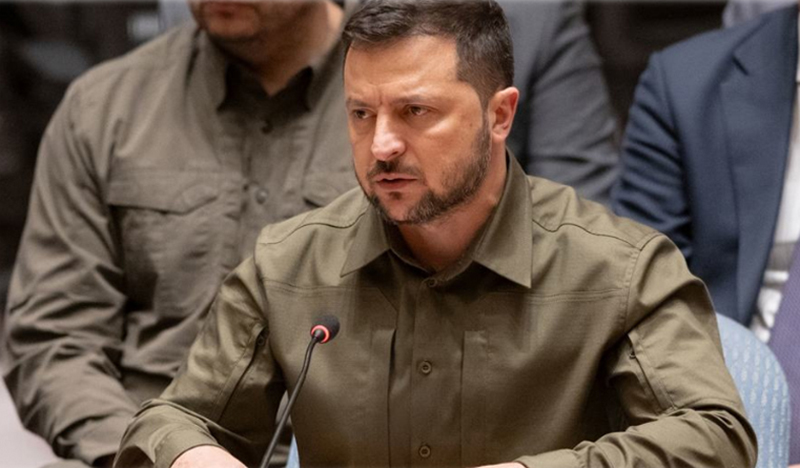 Ukraine-Russia
Ukraine-Russia Ukraine-Russia conflict: President Volodymyr Zelenskyy says Moscow's Security Council veto undermines world body
Ukrainian President Volodymyr Zelenskyy on Wednesday called for expanding the UN Security Council and reforming the right of veto granted to its permanent members, in his first in-person address around the iconic horseshoe table.
“Regardless of who you are, the current UN system still makes you less influential than the veto power possessed by a few and misused by one: Russia. That is to the detriment of all other UN Members,” he said, speaking through an interpreter.
Viable reform process
World leaders and Foreign Ministers attending the annual debate in the UN General Assembly packed into the Security Council chamber for the meeting, which focused on upholding the UN Charter through effective multilateralism in the context of the war in Ukraine, now entering its 20th month.
The Charter is the UN’s founding document and codifies the major principles of international relations, including the sovereign equality of States and the prohibition of the use of force in international relations.
“We should recognize that the UN finds itself in a deadlock on the matters of aggression. Humankind no longer pins its hopes on the UN when it comes to the defense of the sovereign borders of nations,” Zelenskyy told the Council.
"World leaders are seeking new platforms and alliances that could reduce the disastrous scope of problems - the problems that are met here within these walls with rhetoric, rather than real solutions; with aspirations to compromise with killers, rather than to protect lives."
Reform and representation
The Ukrainian President said he was confident that the UN Charter can work effectively for the sake of peace and security globally.
“However, for this to happen, the years-long discussions and projects on UN reform must be translated into a viable process of UN reform,” he added.
“And it should not be only about representation here in the Security Council. The use of veto power, that is what requires the reform.”
He said the right of veto “should not serve those who are obsessed with hatred and war” and that the General Assembly - which comprises all UN Member States - “should be given real power to overcome the veto.”
Early warning mechanism
Zelenskyy said he has welcomed proposals to expand the Security Council to reflect current realities.
Fifteen countries sit on the Council, five of which – China, France, Russia, the United Kingdom and the United States – are permanent members who have the power to veto any resolution or decision. Ten non-permanent members are elected to serve for two-year terms.
“Ukraine considers it is unjust when billions of people do not have their permanent representation in the Security Council,” said Zelenskyy.
UN commitment to Ukraine
UN Secretary-General António Guterres underlined full commitment to the sovereignty, independence and territorial integrity of Ukraine in his remarks to the meeting.
“Russia’s invasion of Ukraine, in clear violation of the United Nations Charter and international law, is aggravating geopolitical tensions and divisions, threatening regional stability, increasing the nuclear threat, and creating deep fissures in our increasingly multipolar world,” he said.
“All this comes at a time when cooperation and compromise for multilateral solutions are needed more than ever, to tackle challenges from the climate crisis to unprecedented levels of inequality to disruptive technologies,” he added.
Dialogue, diplomacy and peace
Guterres said the UN has been clear in condemning the war, which began on 24 February. He recalled that the General Assembly overwhelmingly approved a resolution demanding that Russia leave Ukraine, and a another rejecting its efforts to annex Ukrainian territory.
The Secretary-General also outlined the brutal toll of the conflict, including relentless attacks on civilians and civilian infrastructure, tens of thousands killed or injured, shocking human rights violations, and millions now in need of aid and protection.
“This war is already causing limitless suffering. Its continuation risks further perilous escalation,” he warned. “There is no alternative to dialogue, diplomacy, and a just peace.”
Fully respect UN Charter: Russia
The meeting was chaired by the Prime Minister of Albania, Edi Rama, as the country holds the rotating Council presidency this month.
At the outset, Russia's Ambassador to the UN, Vassily Nebenzya, questioned why President Zelenskyy was allowed to speak ahead of representatives of countries that are on the Council, and why North Macedonian Foreign Minister, Bujar Osmani, who is the chair of the Organization for Security and Co-operation in Europe (OSCE), was invited.
Foreign Minister Sergey Lavrov spoke in the Council chamber on behalf of Russia, saying his country continues to insist on all provisions of the UN Charter being respected and applied in their entirety, not selectively.
“This includes the principle of the sovereign equality of States, non-intervention in their domestic affairs, respect for territorial sovereignty and territorial integrity, and the right of peoples to self-determination,” he said, speaking through an interpreter.
Support Our Journalism
We cannot do without you.. your contribution supports unbiased journalism
IBNS is not driven by any ism- not wokeism, not racism, not skewed secularism, not hyper right-wing or left liberal ideals, nor by any hardline religious beliefs or hyper nationalism. We want to serve you good old objective news, as they are. We do not judge or preach. We let people decide for themselves. We only try to present factual and well-sourced news.







